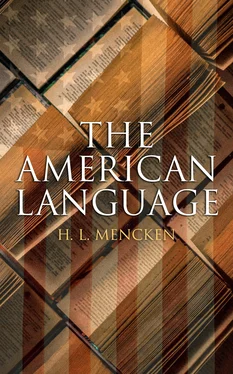In the London Daily Mail, W. G. Faulkner lately launched this proposed campaign of education by undertaking to explain various terms appearing in American moving-pictures to English spectators. Mr. Faulkner assumed that most of his readers would understand sombrero , sidewalk , candy-store , freight-car , boost , elevator , boss , crook and fall (for autumn ) without help, but he found it necessary to define such commonplace Americanisms as hoodlum , hobo , bunco-steerer , rubber-neck , drummer , sucker , dive (in the sense of a thieves' resort), clean-up , graft and to feature . Curiously enough, he proved the reality of the difficulties he essayed to level by falling into error as to the meanings of some of the terms he listed, among them dead-beat , flume , dub and stag . Another English expositor, apparently following him, thought it necessary to add definitions of hold-up , quitter , rube , shack , road-agent , cinch , live-wire and scab , 23but he, too, mistook the meaning of dead-beat , and in addition he misdefined band-wagon and substituted get-out , seemingly an invention of his own, for get-away . Faulkner, somewhat belated in his animosity, seized the opportunity to read a homily upon the vulgarity and extravagance of the American language, and argued that the introduction of its coinages through the moving-picture theatre ( Anglais, cinema ) "cannot be regarded without serious misgivings, if only because it generates and encourages mental indiscipline so far as the choice of expressions is concerned." In other words, the greater pliability and resourcefulness of American is a fault to be corrected by the English tendency to hold to that which is established.
Cecil Chesterton, in the New Witness, recently called attention to the increasing difficulty of intercommunication, not only verbally, but in writing. The American newspapers, he said, even the best of them, admit more and more locutions that puzzle and dismay an English reader. After quoting a characteristic headline he went on:
I defy any ordinary Englishman to say that that is the English language or that he can find any intelligible meaning in it. Even a dictionary will be of no use to him. He must know the language colloquially or not at all.... No doubt it is easier for an Englishman to understand American than it would be for a Frenchman to do the same, just as it is easier for a German to understand Dutch than it would be for a Spaniard. But it does not make the American language identical with the English. 24
Chesterton, however, refrained from denouncing this lack of identity; on the contrary, he allowed certain merits to American. "I do not want anybody to suppose," he said, "that the American language is in any way inferior to ours. In some ways it has improved upon it in vigor and raciness. In other ways it adheres more closely to the English of the best period." Testimony to the same end was furnished before this by William Archer. "New words," he said, "are begotten by new conditions of life; and as American life is far more fertile of new conditions than ours, the tendency toward neologism cannot but be stronger in America than in England. America has enormously enriched the language, not only with new words, but (since the American mind is, on the whole, quicker and wittier than the English) with apt and luminous colloquial metaphors." 25
The list of such quotations might be indefinitely prolonged. There is scarcely an English book upon the United States which does not offer some discussion, more or less profound, of American peculiarities of speech, both as they are revealed in spoken discourse (particularly pronunciation and intonation) and as they show themselves in popular literature and in the newspapers, and to this discussion protest is often added, as it very often is by the reviews and newspapers. "The Americans," says a typical critic, "have so far progressed with their self-appointed task of creating an American language that much of their conversation is now incomprehensible to English people." 26On our own side there is almost equal evidence of a sense of difference, despite the fact that the educated American is presumably trained in orthodox English, and can at least read it without much feeling of strangeness. "The American," says George Ade, in his book of travel, "In Pastures New," "must go to England in order to learn for a dead certainty that he does not speak the English language.... This pitiful fact comes home to every American when he arrives in London—that there are two languages, the English and the American. One is correct; the other is incorrect. One is a pure and limpid stream; the other is a stagnant pool, swarming with bacilli." 27This was written in 1906. Twenty-five years earlier Mark Twain had made the same observation. "When I speak my native tongue in its utmost purity in England," he said, "an Englishman can't understand me at all." 28The languages, continued Mark, "were identical several generations ago, but our changed conditions and the spread of our people far to the south and far to the west have made many alterations in our pronunciation, and have introduced new words among us and changed the meanings of old ones." Even before this the great humorist had marked and hailed these differences. Already in "Roughing It" he was celebrating "the vigorous new vernacular of the occidental plains and mountains," 29and in all his writings, even the most serious, he deliberately engrafted its greater liberty and more fluent idiom upon the stem of English, and so lent the dignity of his high achievement to a dialect that was as unmistakably American as the point of view underlying it.
The same tendency is plainly visible in William Dean Howells. His novels are mines of American idiom, and his style shows an undeniable revolt against the trammels of English grammarians. In 1886 he made a plea in Harper's for a concerted effort to put American on its own legs. "If we bother ourselves," he said, "to write what the critics imagine to be 'English,' we shall be priggish and artificial, and still more so if we make our Americans talk 'English.' ... On our lips our continental English will differ more and more from the insular English, and we believe that this is not deplorable but desirable." 30Howells then proceeded to discuss the nature of the difference, and described it accurately as determined by the greater rigidity and formality of the English of modern England. In American, he said, there was to be seen that easy looseness of phrase and gait which characterized the English of the Elizabethan era, and particularly the Elizabethan hospitality to changed meanings and bold metaphors. American, he argued, made new words much faster than English, and they were, in the main, words of much greater daring and savor.
The difference between the two tongues, thus noted by the writers of both, was made disconcertingly apparent to the American troops when they first got to France and came into contact with the English. Fraternizing was made difficult by the wide divergence in vocabulary and pronunciation—a divergence interpreted by each side as a sign of uncouthness. The Y. M. C. A. made a characteristic effort to turn the resultant feeling of strangeness and homesickness among the Americans to account. In the Chicago Tribune's Paris edition of July 7, 1917, I find a large advertisement inviting them to make use of the Y. M. C. A. clubhouse in the Avenue Montaigue, "where American is spoken." Earlier in the war the Illinoiser Staats Zeitung, no doubt seeking to keep the sense of difference alive, advertised that it would "publish articles daily in the American language."
Читать дальше












